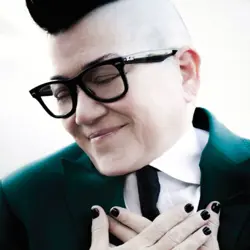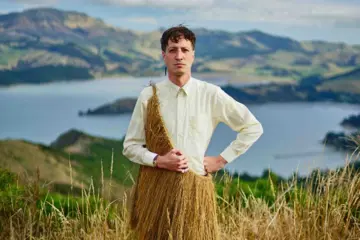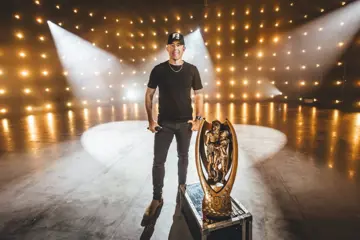 Lea DeLaria
Lea DeLariaLea DeLaria, aka Big Boo from the Netflix megahit Orange Is The New Black, isn't easily pigeonholed. You may know her as an actor, but she's also a sought-after stand-up comic, a jazz musician with five studio albums to her name, and a Broadway veteran. In June, she'll tour Australia with her all-female band, performing a mix of comedy and jazz, as well as tracks from her recent David Bowie tribute record, House Of David.
When she's not performing, she's an outspoken activist and a sometimes-controversial political raconteur. She's also proudly Queer and a self-proclaimed "butch" lesbian who was twice arrested for "open and notorious homosexuality" in the late '70s.
But if you had to pick one unifying trait for DeLaria's multi-faceted persona, it might be her gloriously defiant spirit - a quality that has been ever-present throughout her life. Coming out of the closet at a time when being gay was still illegal in every state of the Union, DeLaria has faced down the homophobia of America's conservative patriarchy from her teen years. In the three or so decades since then, she's witnessed a major thaw in the way the LGBTQIA+ community is treated in her native US and elsewhere around the world. But while this social progress is undoubtedly positive, it can also be problematic, DeLaria says.
"My biggest fear is that we'll become homogenised as we become mainstream. As we are more and more, quote-unquote, 'accepted by society,' which by the way I never asked for your acceptance. I've always demanded your respect. I could give a fuck about your acceptance, who cares, you know? But as we gain more and more acceptance we need to keep our identity. That's really important to me," she shares.
Don't miss a beat with our FREE daily newsletter
"You know when we start talking about the community using the Lesbian Gay Bisexual Transgender bibbity-bobbity-boo jargon, well, I never say it. I don't do the alphabet soup. I say Queer, because Queer encompasses all. And when you say the alphabet soup, basically you're pointing out our differences and what that does is perpetuate the infighting within my community. Which is our biggest downfall. If we spent half the time we spent screaming at each other screaming at the powers that be we would've had our rights fucking a hundred years ago. You know what I mean?
"So, this is what I fear. I hate when I go to a fucking gay pride rally and there's some faggotty little white bitch queen on stage talking about how 'We're just like everybody else.' That's when a drag queen walks by with three-foot spangled platforms and opens her butterfly wings. You know, we're not like everybody else, and that's a beautiful thing. We should keep our identity, we should be who we are. Demand respect, be yourself, and give me my rights."
"I just did not want the people behind me to grow up in the fucking horrifying world that I grew up in."
Equality has been the ultimate goal of the gay rights movement since the Stonewall riots, driving the years of protest and progress that have followed. But in what could be described as cultural gentrification, the Queer identity has acquired a fashionable frisson of hipster chic as it has moved from the social fringes and been welcomed into the pop-culture spotlight. The Queer community risks losing sight of its subversive heritage by trading authenticity for mainstream appeal, DeLaria believes. There are, however, some heartening examples to the contrary.
When it premiered in 2013, Orange Is The New Black — the quirky, uncompromising and unapologetic dramedy about women in America's penal system — was an instant hit. Without pandering or dumbing down, it offered an often mordant portrait of female prisoners, capturing their individuality, their cultural diversity, their sexual agency and queerness, and perhaps most importantly, their resilience while struggling against a broken system.
"It offers a view of what it is to be a woman. Period," DeLaria says of the show. "Personally, as someone who is butch, I could never turn on any television show and see people like me. I mean the closest we came to it was Franky in Prisoner: Cell Block H, back when I was in high school. And even that was not a realistic portrayal. That was a cartoon portrayal like all queer portrayals at that time.
"All of us women are beautiful. We're all beautiful just the way we are. We are all beautiful no matter what our size. We are all beautiful no matter what our race. We are beautiful no matter what our biological gender. Women do more than just sit around and talk about whether their ass looks fat in their jeans. And our show shows that."
DeLaria's character is a firm fan favourite. As a buzz-cut, heavily inked, butch AF inmate, Big Boo is immediately intimidating to the show's middle-class protagonist Piper Chapman (played by Taylor Schilling). But as the show has progressed, and her storylines have blossomed over Orange Is The New Black's five seasons, it has revealed Boo as a charismatic, witty, street savvy underdog with a roguish heart of gold.
And the secret to capturing such a well-realised and sincere characterisation? "Big Boo is me," Delaria responds.
"It's fucking me, I'm not acting at all. I'm just me. And if you want to see me act, come see me do some theatre stuff. But Big Boo is completely me, it's just realistically me. There was no Big Boo in the show originally. I mean, this was kind of fairly well-known. Big Boo was a minor character that was going to have two lines. But Jenji [Kohne, the show's creator] loved me. The writers loved me. So when they realised that there was no Big Boo, that there was literally no butch, no butch at all — in a women's prison! That's just fucking ridiculous — they made the character [more prominent]."
The success of Orange Is The New Black has made household names of its ensemble cast. True to her activist's spirit, DeLaria isn't about to waste the opportunity. "If you're successful then you've got a much bigger platform from which to do something with your art. And that's what I do. I've always tried to use what I call my power for good. I mean, that's just been me from moment one. I just did not want the people behind me to grow up in the fucking horrifying world that I grew up in. And I knew that I could affect change with my voice and with my art, if you want to call it that. Calling myself an 'artist' makes me want to fart sometimes," Delaria says with a chuckle. "When I see stand-up comics talking about losing their fucking socks in the dryer or airplane food or whatever, I just want to kill myself. It's like, this is what you've chosen to do with this platform that you have?
"A cultural movement coupled with a political movement has always been the one that affects change, and artists will always be at the forefront of that change. Always."
Lea DeLaria performs Live In Concert, 5 Jun at QPAC, 7 Jun at Melbourne Recital Centre, and 9 Jun at City Recital Hall Sydney















